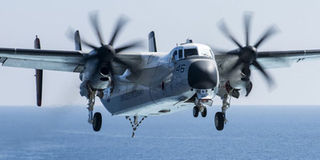Three missing after US Navy aircraft crash in Philippine Sea

In this photo released by the US Navy a C-2A Greyhound logistics aircraft prepares to land on the flight deck of the aircraft carrier as massive search expands for three US sailors after Philippine Sea air crash.
AFP PHOTO
What you need to know:
- There was no immediate information on what kind of aircraft was involved, but over 60 planes and helicopters of different types operate from the USS Ronald Reagan, according to the carrier group's website.
US military vessels have been involved in a number of accidents in recent months in East Asia.
Eight people have been rescued after a US military aircraft with 11 people aboard crashed into the Philippine Sea en route to an aircraft carrier, Japan said on Wednesday.
Japanese and American rescuers scrambled to reach the downed aircraft in seas off the remote Japanese reef of Okinotori, in the latest accident to hit American armed forces in East Asia.
The government in Tokyo said it had been informed eight people had been plucked to safety, and three more were still missing. The US authorities said engine trouble was the suspected cause of the accident.
"Personnel recovery is under way and their condition will be evaluated by USS Ronald Reagan medical staff," a US Navy statement said.
"The aircraft was en route to the US Navy aircraft carrier USS Ronald Reagan, which is currently operating in the Philippine Sea."
In Tokyo, Defense Minister Itsunori Onodera said a joint operation had been launched.
"Currently a search-and-rescue mission is being conducted in the area by the US side as well as the Japan Maritime Self Defense Force," he told reporters.
"From the US military, we have received an initial report that engine trouble might be the cause," he said.
There was no immediate information on what kind of aircraft was involved, but over 60 planes and helicopters of different types operate from the USS Ronald Reagan, according to the carrier group's website.
These include F/A-18 Super Hornet fighters, early warning and electronic attack planes, transports, and MH-60 Seahawk multi-purpose helicopters.
The US military has a heavy presence in the western Pacific, with tens of thousands of troops and billions of dollars' worth of hardware stationed throughout Japan and South Korea.
US military vessels have been involved in a number of accidents in recent months in East Asia.
The USS John S. McCain collided with a tanker off Singapore in August, killing 10 sailors and injuring five others.
Two months earlier in June, the USS Fitzgerald and a cargo ship smashed into each other off Japan, leaving seven sailors dead.
There were also two more, lesser-known incidents. In January USS Antietam ran aground near its base in Japan, and in May, USS Lake Champlain collided with a South Korean fishing vessel.
The Ronald Reagan last week was one of three American aircraft carriers that held rare joint drills in the region, joined separately by Japanese navy and South Korean warships over the weekend.
The nuclear-powered Reagan is one of 10 Nimitz class supercarriers, which the US Navy describes as the largest warships in the world. The Reagan has a crew of 4,225 and is 333 metres (1092 feet) long.
The drills come as tensions persist between Washington and North Korea over its missile and nuclear programme.




